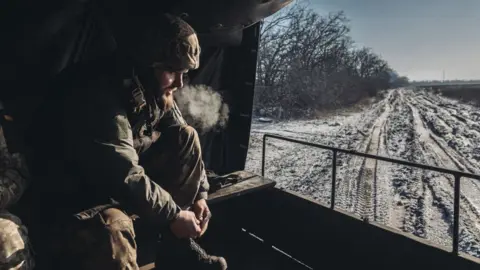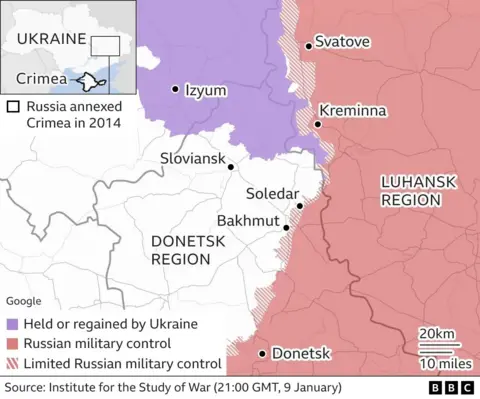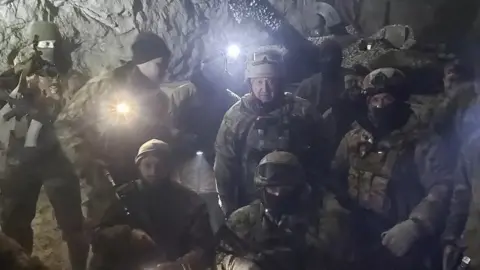Ukraine war: Who controls Soledar and why it matters
 Getty Images
Getty ImagesRussia has not taken a key town or city in Ukraine for months, despite intense efforts to achieve military gains.
If Russian forces seize the eastern town of Soledar, their hope is that the course of the war could change.
Who controls Soledar?
When Russian mercenary leader Yevgeniy Prigozhin announced his Wagner units had taken control of the entire territory of Soledar, the images produced looked convincing.
But Wagner fighters are not part of the regular Russian armed forces and the defence ministry in Moscow says the battle is still going on.
Ukraine's president also says the fight is continuing and Kyiv is adamant the Russians are not succeeding in their push to capture the town.
Why Soledar matters
The fall of Soledar may help Russian troops in their assault on the Ukrainian city of Bakhmut, about 10km (6 miles) to the south west, providing them with a secure artillery position within range of the city.

Soledar also has deep salt mines, which could be used to station troops and store equipment, protected from Ukrainian missiles.
In video posted on a Russian Telegram channel, which the BBC has not yet been able to verify, Mr Prigozhin is apparently seen alongside Wagner soldiers in a Soledar salt mine.
The mines have an extensive underground network of tunnels, which could be of strategic importance as Russian forces attempt to penetrate Ukrainian-controlled territory.
It is not clear, however, how much of this network is accessible and where it might lead.
 Reuters
ReutersSoledar's mines also contain valuable salt and gypsum, which could provide an important source of revenue for anyone who controls and is able to extract resources from it.
But perhaps one of the most important factors in the battle for Soledar is a symbolic one.
"The reason they are throwing everything at it," says the BBC's James Waterhouse in Ukraine, "is that there is a big propaganda win here… a vital trophy for President Vladimir Putin to present to critics back in Russia".
The importance of Bakhmut
Taking control of the nearby city Bakhmut would certainly be a prize for Russian forces in the region.
"This would be a much needed boost for Russian forces in the east who have been under real pressure since September," says Edward Arnold, a European security researcher at the Royal United Services Institute (Rusi).
However, he adds that "the seizure of Bakhmut will have little strategic significance for the outcome of the war".
The role of mercenaries
The Wagner Group has become increasingly influential in the Ukraine conflict and Mr Prigozhin has been behind its advance on the battlefield.
He claims his fighters are the only ones fighting in Soledar, although the Russian defence ministry says its forces are also taking part.
The battle for Soledar and Bakhmut is only part of the front line and the broader campaign is not going well for Vladimir Putin.
Russia again replaced the head of its regular forces in Ukraine only three months after he was put in place, in another sign of dissatisfaction at the lack of progress.
"[Prigozhin will] continue to use both confirmed and fabricated Wagner Group success in Soledar and Bakhmut," says the Institute for the Study of War "to promote [it] as the only Russian force in Ukraine capable of securing tangible gains."
Wagner has also been prominent in conflict zones in Africa, invited in by governments battling insurgent rebel forces. In doing so, the mercenaries have often taken control of valuable mining resources.
Reporting by Jake Horton and Tom Spencer.

